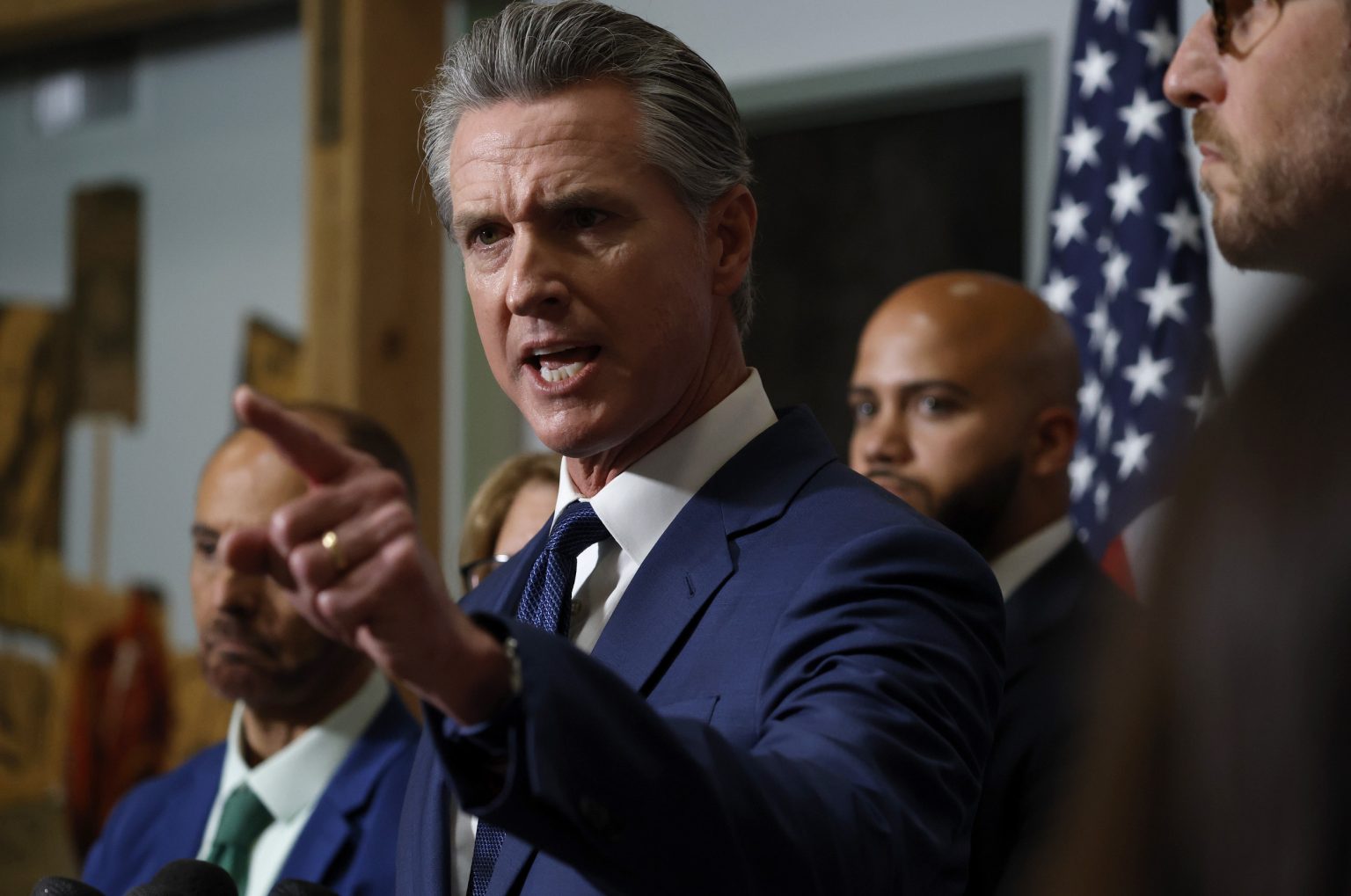Gavin Newsom Emerges as Early Democratic Frontrunner for 2028
In a political landscape still reeling from the 2024 election results, California Governor Gavin Newsom has surprisingly emerged as the early frontrunner for the Democratic presidential nomination in 2028, according to a recent Yahoo/YouGov poll. While it may seem premature to discuss the next presidential election cycle, the Democratic Party is already looking ahead to identify potential standard-bearers who can effectively challenge Republican policies and messaging. Newsom’s rise to prominence comes after he adopted a more aggressive stance against President Trump and Republican policies, a strategy that appears to resonate with many Democratic voters seeking a more combative approach from their leaders. Though Newsom himself has downplayed presidential ambitions, stating to The Wall Street Journal, “I’m not thinking about running, but it’s a path that I could see unfold,” his increased national visibility and confrontational style have clearly positioned him as a figure to watch in the coming years.
The poll results reveal a fascinating shift in Democratic voter preferences, with Newsom capturing 21 percent support among registered Democratic-leaning voters, narrowly edging out former Vice President Kamala Harris at 19 percent. Other prominent Democrats trail significantly, with Representative Alexandria Ocasio-Cortez at 12 percent, former Transportation Secretary Pete Buttigieg at 10 percent, and Illinois Governor JB Pritzker at 7 percent. What makes this particularly noteworthy is Newsom’s rapid ascent in the polls—an Echelon Insights survey from April had him in sixth place with just 4 percent support, while by mid-August, he had climbed to second place with 13 percent. This trajectory suggests his recent political strategies and increased national presence are paying dividends among Democratic voters seeking a forceful counterpoint to Republican messaging. The survey of 1,690 U.S. adults was conducted from August 29 to September 2, with a margin of error of approximately 3.1 percent, giving credibility to these early indicators of voter preference.
Interestingly, the demographic breakdown of Newsom’s support reveals a generational divide within the Democratic electorate. His strength is predominantly concentrated among Democrats over 45 years old, where he leads Harris by a substantial margin of 26 percent to 13 percent. Conversely, younger Democrats and Democratic-leaning voters under 45 prefer both Harris (27 percent) and Ocasio-Cortez (22 percent) to Newsom (13 percent). This age-based preference pattern could prove significant in shaping campaign strategies as the 2028 election cycle eventually takes form, potentially influencing how candidates position themselves and which issues they emphasize to build broad-based support across demographic groups. It also suggests that while Newsom’s more confrontational approach appeals to older Democrats who may prioritize experience and assertiveness, younger voters might be looking for different qualities in their party’s next presidential nominee.
Newsom’s rising profile can be attributed largely to his increasingly vocal opposition to Trump and Republican policies, particularly on contentious issues like the redrawing of state congressional boundaries and the deployment of the National Guard. His social media strategy has notably evolved to include mocking Trump, sometimes even imitating the former president’s all-caps style—though the poll suggests this specific tactic has mixed reviews, with 33 percent approving and 43 percent disapproving. Nevertheless, as CNN analyst Harry Enten observed, “Newsom’s social media strategy/opposition to Trump is working. He’s gained millions of social media followers. Google searches for him are up like a rocket.” This increased visibility appears to be meeting a demand among Democratic voters for leaders willing to take a more aggressive stance against Republican policies and rhetoric, particularly after what many in the base perceived as insufficient pushback during previous administrations.
The political calculus behind Newsom’s potential candidacy is complex and inevitably tied to his record as California’s governor, where he has implemented progressive policies but also faced criticism. Trump himself has weighed in, telling reporters, “He’s done a terrible job. I like Gavin Newsom. He’s a nice guy, but he’s grossly incompetent, everybody knows.” Such critiques would undoubtedly form the backbone of Republican opposition should Newsom become the Democratic nominee. However, his defenders point to California’s strong economy, environmental leadership, and Newsom’s handling of challenges like the COVID-19 pandemic as evidence of effective governance. As governor of the nation’s most populous state, Newsom has a substantial record to defend and promote, giving him both advantages and vulnerabilities that would shape any presidential campaign. His second term as governor ends in early 2027, providing a natural timeline for a potential presidential run.
While political observers will continue monitoring polls and candidate positioning, it’s worth remembering that the 2028 presidential landscape remains highly fluid and unpredictable. Traditionally, serious candidates don’t announce their intentions until after the midterm elections, which in this case would be 2026. The intervening years will see countless political developments that could dramatically reshape voter preferences and candidate viabilities. Numerous prominent Democrats are expected to consider presidential bids, and the party’s eventual nominee will need to build coalitions across demographic, ideological, and geographic lines. What the current polling does suggest, however, is that Gavin Newsom has successfully positioned himself as a leading contender through his confrontational approach to Republican policies and his increasing national presence. Whether this early advantage translates into sustained support—and eventually a nomination—remains one of the most intriguing questions in American politics as we look beyond the immediate electoral horizon.


